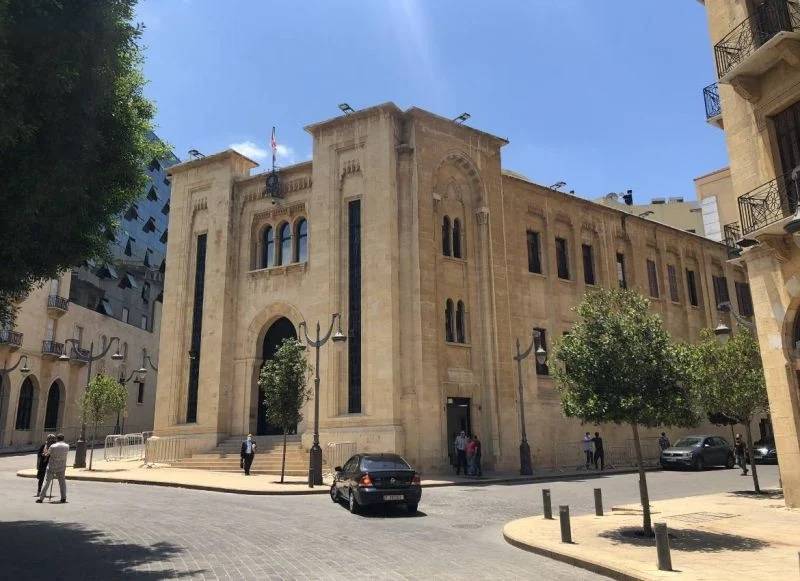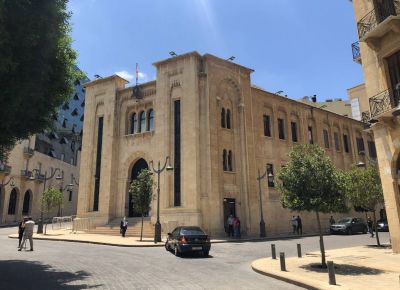
The Finance Committee met on Tuesday with caretaker Finance Minister Youssef Khalil. (Credit: PHB)
Caretaker Finance Minister Youssef Khalil agreed Tuesday to delay action on decisions No. 686/1 and 687/1 dated Nov. 23. These two decisions set the rules for the implementation of provisions in the 2022 budget law adjusting income tax — including salary deductions by employers — to the current monetary situation in the country, which has been in financial and economic crisis since 2019.
The agreement to delay implementation was reported on Tuesday by the chairman of the Finance and Budget Committee, Ibrahim Kanaan, with whom the minister met in the middle of the day.
According to Kanaan, who held a press conference immediately after the meeting, the minister responded to MPs’ request by agreeing to “revise” the two decisions that would have heavy consequences for companies and private sector employees.
“The minister is expected to take a few days to make changes to these decisions, in light of the discussions that the committee had with him,” the MP told L’Orient-Le Jour.
He added that the MPs put forward several arguments to convince the minister to review his decision, including the fact that this measure was taken less than a month and a half from the end of the calendar year — the budget law was voted in September and only came into force on Nov. 15 — the unfairness of the adjustments made and the impossibility of implementing the retroactive element of some of the planned procedures.
When contacted, the Finance Ministry did not comment on the proposed changes. In a statement issued late in the day, the minister did not categorically confirm the parliamentary committee’s claims.
He said that he had “heard the views” of its members and informed them that he would carry on with the meetings “which were previously initiated with trade unions, economic actors and other stakeholders” in order to take the “appropriate decision” so as to reach a formula that would meet the needs of employees, employers and the Treasury.
Other decisions unchanged
The official pegged exchange rate of LL1,507.5 to the US dollar was officially abandoned in the 2o22 budget law. This rate has in practice been rendered obsolete by the depreciation of the lira (presently trading at over LL41,000 to the dollar on the parallel market), but had until Dec. 1 been used when calculating all taxes.
More specifically, articles 27, 33 and 35 of the 2022 budget law endorsed an adjustment of the income tax by multiplying the taxable income brackets (by three), the abatements (by seven) and, most importantly, by requiring taxpayers to use the central bank’s Sayrafa exchange rate (a floating rate that currently stands around LL30,300) to calculate in lira the taxable income paid in foreign currency.
If implemented, the provisions of the two suspended decisions would have the virtual effect of drastically increasing the amount of tax owed by employees whose salaries were increased or are partially paid in fresh dollars, and also risk skyrocketing the social security charges paid by the employers.
They were opposed by the trade unions and even some employers’ organizations, which consider the transition from the old system to the new too abrupt, among other criticisms.
The other decisions that the minister adopted on Nov. 23 were not suspended. They include decision no. 684/1, which requires the use of the Sayrafa exchange rate to calculate the value of tax stamps based on the amounts in foreign currency, as well as decisions no. 685/=1 and no. 688/1, which adjust the way of calculating the valuation of several real estate categories.
The adoption of the 2022 budget law is part of the International Monetary Fund-imposed reforms under the staff-level agreement on economic policies signed in April. It also led to an adjustment of the exchange rate used to calculate customs duties, which increased from LL1507.5 to LL15,000 on Dec. 1.
This article was originally published in French in L'Orient-Le Jour. Translation by Joelle El Khoury.
